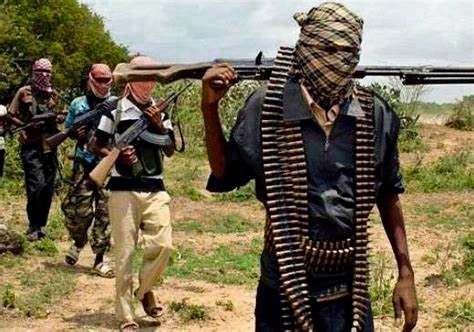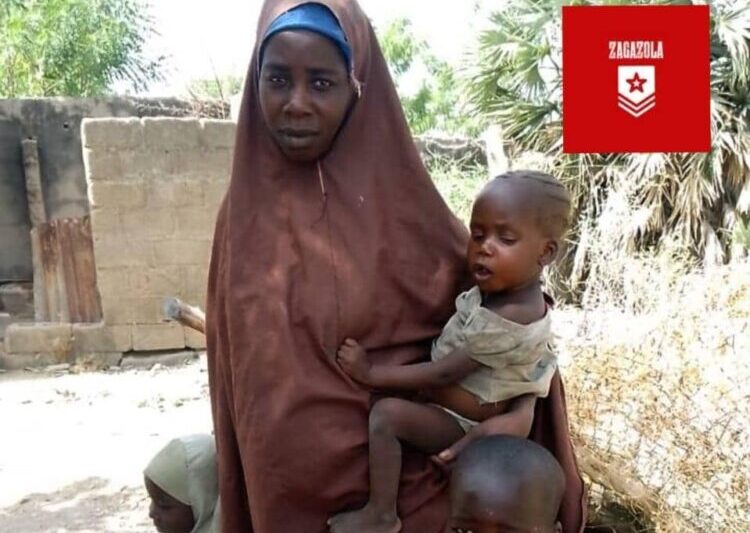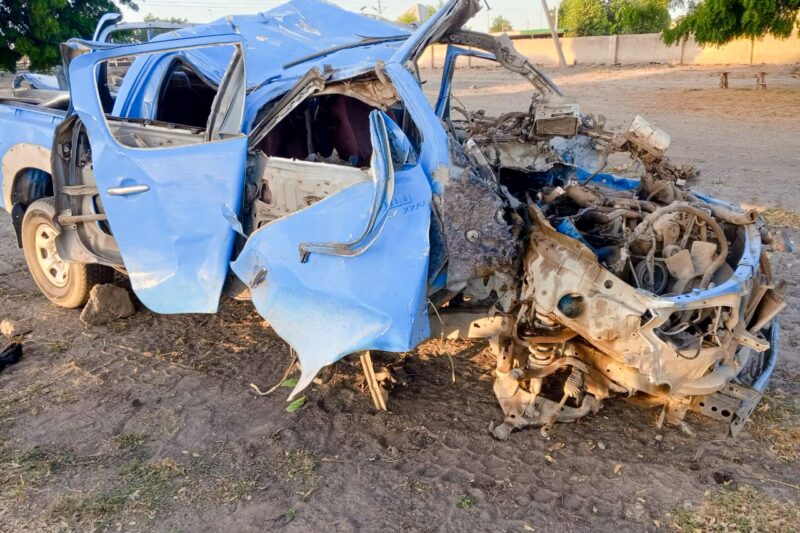Famished, down-and-out internally displaced persons – who were forced to leave Bakassi camp six months ago when the Borno State governor, Babagana Zulum, ordered that all IDP camps within Maiduguri would be shut down on December 31, 2021 – are having such a hard time in the outside world, they would rather return to what was the overflowing, unhygienic and often disease-ridden camp.
They described their new life in the village as a living hell.
Zulum announced in October last year that the IDP camps would be shut down. At the time, he said one of the reasons the camps would be closed was to protect the integrity of the IDPs who were allegedly becoming involved in criminal activities.
After Bakassi camp was closed six months ago, most of the residents moved to Molai, a village along Damboa-Biu road on the outskirts of the Borno State capital, Maiduguri.
RNI visited the village and spoke to IDPS from the camp, most of whom were originally from the Gwoza Local Government Area.
Many of them said that living outside the camp was very hard, adding that “life inside the camp was better”.
Yahaya Musa, said: “I originally came from Gwoza Local Government Area. I stayed for about six years in Bakassi IDP camp before we were relocated by the government. Prior to the closure of the camp, most of the householders got ₦100,000 and some foodstuffs. I was among those who received the ₦100,000 but I knew it would not be enough to sustain our livelihoods. How can anyone start a business, feed the family, pay school fees and medical bills, among other things, with only ₦100,000? It’s impossible.
“As I’m speaking to you now, I have a wife and nine children and I always struggle to feed them. I opened up a shop to sell pharmaceutical medicines because it soon became very clear that ₦100,000 goes nowhere when you have a family to look after. But I had to work hard, going to the nearby forest to fetch firewood to sell. Eventually, I was able to save a little money to start up the pharmaceutical medicine business in Molai to try to make a decent living. ”
Musa said there were more than 100 IDPs, mostly householders from Gwoza, who were living in Molai.
One of the reasons, Zulum gave for closing Bakassi and other IDP camps was that the insurgency had mostly abated and they would be able to return to their ancestral homes to resettle, begin farming again or start businesses. Zulum said the IDPs would be independent and would be able to start a new life in the home towns they loved.
But Musa said the reason most of the Gwoza IDPs had decided to stay in Molai village was that if they returned to their home towns, they would not be able to farm because members of the Jamā’at Ahl as-Sunnah lid-Da’way Wa’l-Jihād (JAS), better known as Boko Haram, were still attacking residents who went into the forest or bushes in the area. He said he had heard this from some of the IDPs who had returned to their home towns.
He said he knew some who had returned to Gwoza now wanted to come back to Maiduguri because life was so hard there and they were unable to farm or conduct other businesses there.
“So, that’s why we chose to stay in Molai, despite the fact that life is very difficult for us and our living conditions are critical and poor. In fact, life inside the camp was better because we were able to do some trading or other business activities and we also got humanitarian aid from local and international non-governmental organisations (NGOs), as well as from the government. But here, we receive no help. We just have to do whatever we can to survive. Life is very hard.
“We are pleading with the Borno State government and NGOs to support us by providing food, essential household items and other humanitarian aid to complement our fragile lifestyle. We also need farming implements, so that we can at least work some land in the nearby forests.”
Goni Zarami Dalwa told RNI that there were quite a number of IDPs living in Molai village, apart from those who had moved there when the Bakassi camp was closed.
“As more IDPs move to the village we need humanitarian aid even more. I’m a displaced person, originally from Dalwa village in the Konduga Local Government Area. I have been living in Molai for almost nine years, after we were given a place to stay by one of the ward heads, Bulama Abu.
“There are many challenges living here, particularly famine. There is not enough food or social services. There are many critical humanitarian crises and it has got worse since IDPs from Bakassi camp moved to Molai. It’s becoming too much for the host community in every respect: Lack of food, clean water, healthcare services, among other basic social amenities.”
Zarami Dalwa said most of the people did not have adequate means to sustain their livelihoods. “Even fetching firewood and farming activities are no longer possible because of the insecurity situation. So, we are always struggling to feed our families.”
He said he was married and had six children. “With the little money I have, I enrolled two of my kids in school, but now they are not going to the school because I don’t have enough money to settle their school fees. We need urgent humanitarian aid because the situation will get worse if we carry on like this, especially if more IDPs join the community.
“I am working as a labourer to cater for my family. Before the insurgency, I was a driver transporting goods from one place to another but, unfortunately, I lost my car. Boko Haram insurgents set it alight. Then, I started selling kolo nuts, before I began to work as a labourer. Every day it is a struggle to look after my family and put food on the table. It is never-ending.”
Zarami Dalwa said the government had to help them get adequate food, clean water and healthcare, among other social services. He wanted the government to open the routes leading their lands so that they could continue farming.
Bakassi IDP camp was one of the oldest camps in Maiduguri. It was in the Bakassi Housing Estate, originally built as part of a Borno State housing project. The camp was home to residents originally from the Monguno, Marte, Gwoza, Guzamala and Nganzai local government areas.
SHETTIMA LAWAN MONGUNO








